Unit 1 Spring Is Coming Lesson 2(21页)课件 2024-2025学年英语冀教版八年级下册
文档属性
| 名称 | Unit 1 Spring Is Coming Lesson 2(21页)课件 2024-2025学年英语冀教版八年级下册 | 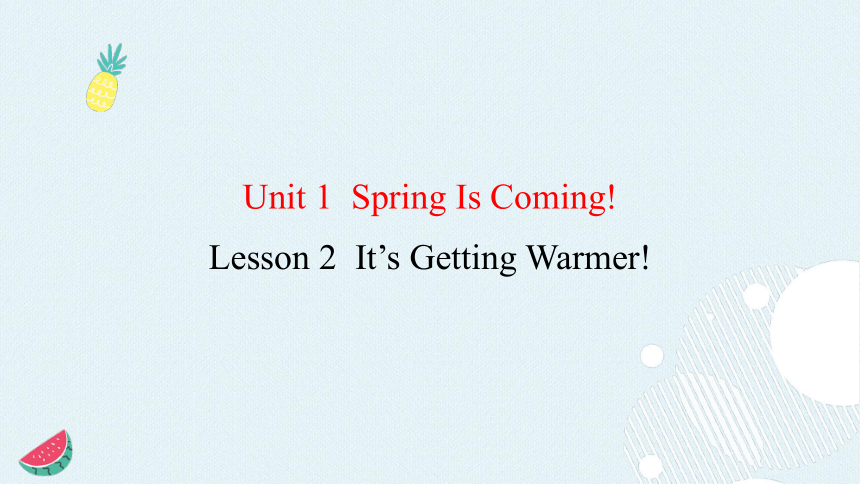 | |
| 格式 | pptx | ||
| 文件大小 | 1.6MB | ||
| 资源类型 | 试卷 | ||
| 版本资源 | 冀教版 | ||
| 科目 | 英语 | ||
| 更新时间 | 2025-02-07 11:21:40 | ||
图片预览

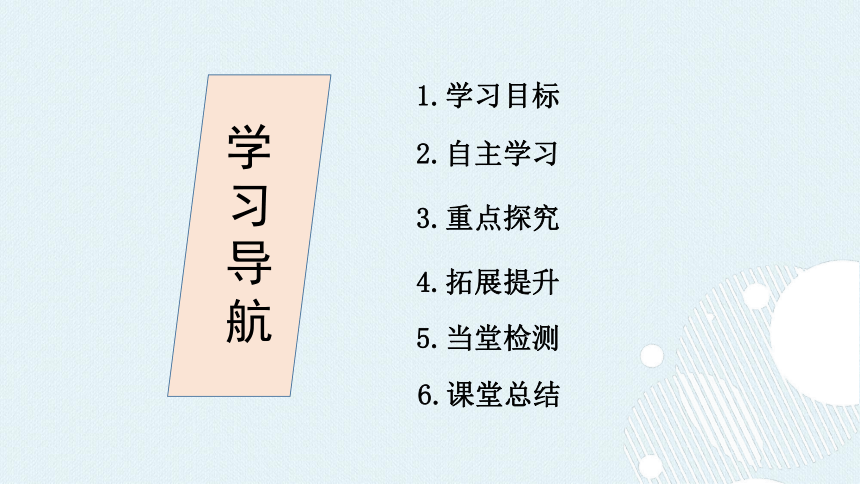
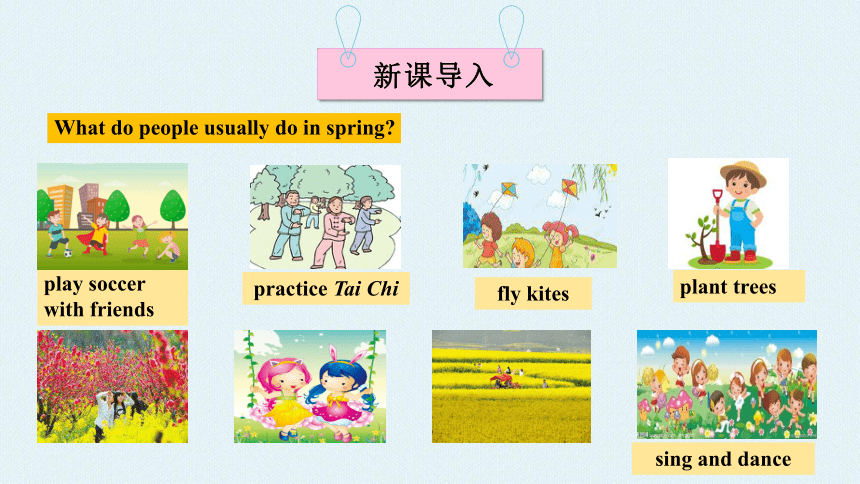
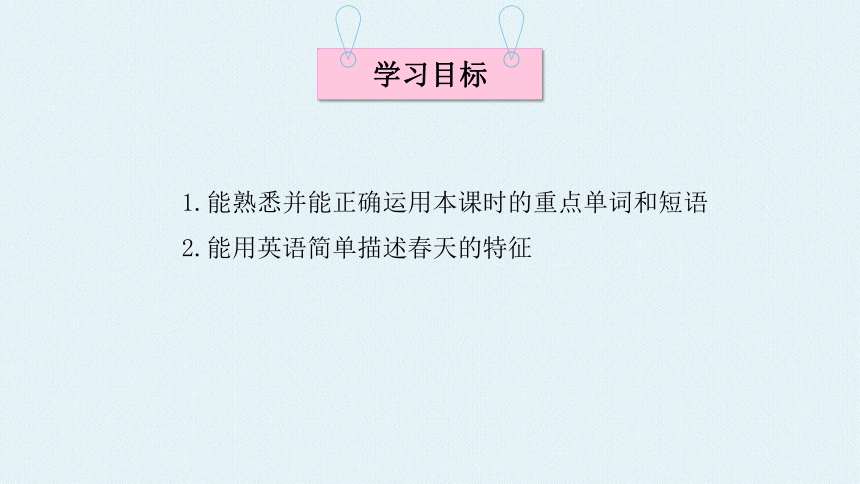
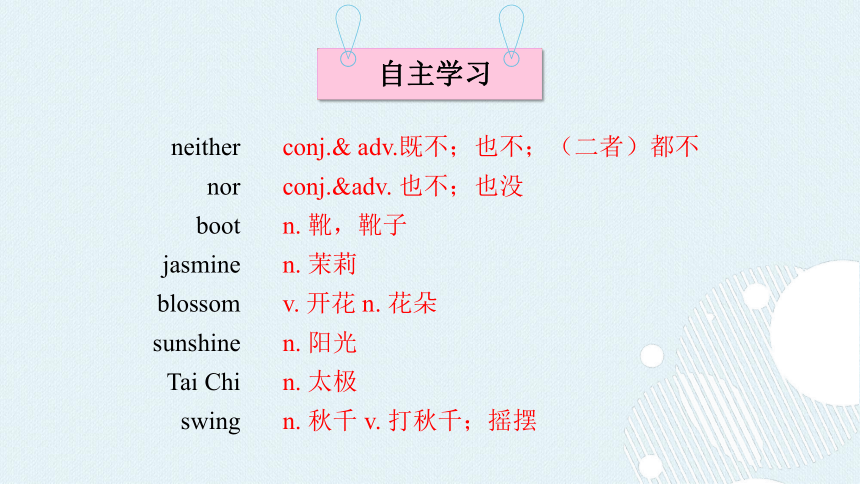
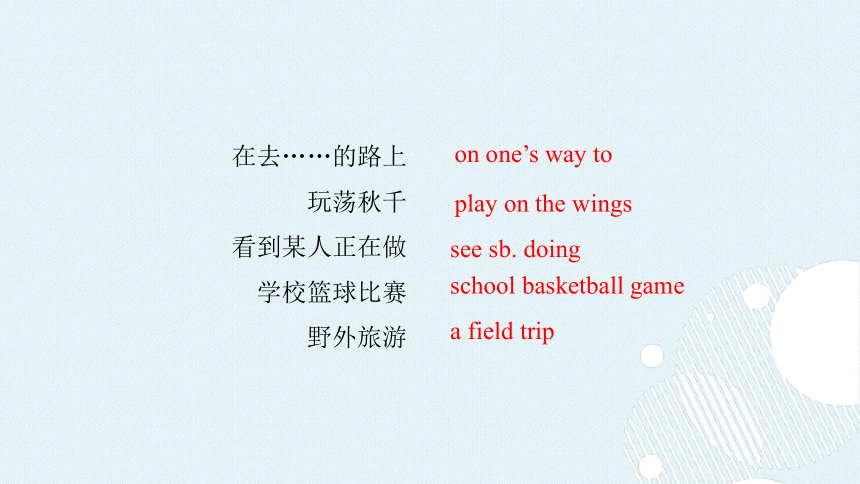
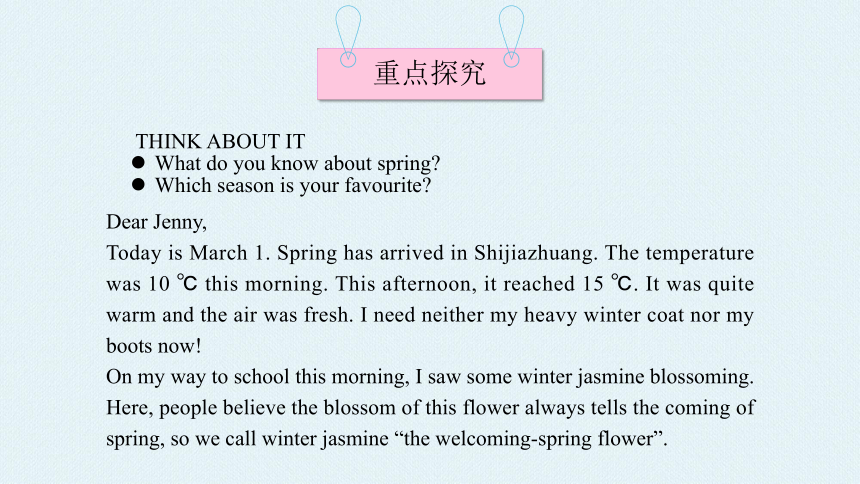

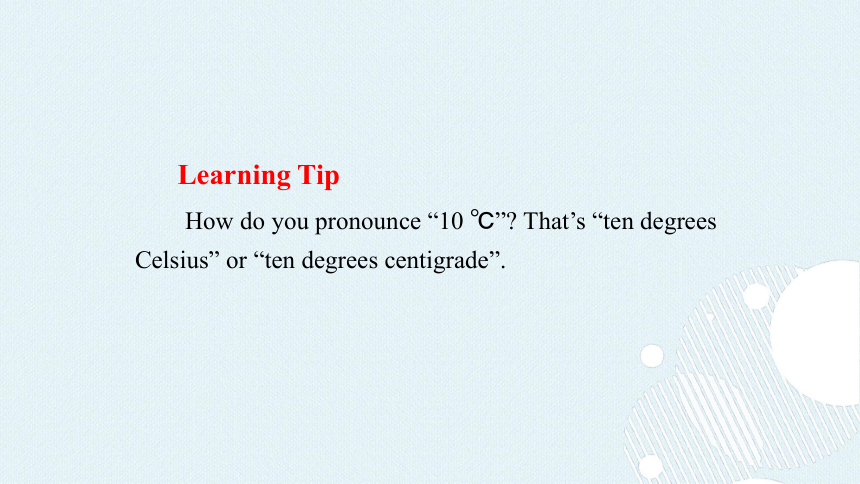
文档简介
(共21张PPT)
Unit 1 Spring Is Coming!
Lesson 2 It’s Getting Warmer!
1.学习目标
3.重点探究
2.自主学习
学习导航
5.当堂检测
6.课堂总结
4.拓展提升
新课导入
What do people usually do in spring
play soccer with friends
practice Tai Chi
fly kites
plant trees
sing and dance
学习目标
1.能熟悉并能正确运用本课时的重点单词和短语2.能用英语简单描述春天的特征
自主学习
neither
nor
boot
jasmine
blossom
sunshine
Tai Chi
swing
conj.& adv.既不;也不;(二者)都不
conj.&adv. 也不;也没
n. 靴,靴子
n. 茉莉
v. 开花 n. 花朵
n. 阳光
n. 太极
n. 秋千 v. 打秋千;摇摆
在去……的路上
玩荡秋千
看到某人正在做
学校篮球比赛
野外旅游
a field trip
play on the wings
on one’s way to
see sb. doing
school basketball game
重点探究
THINK ABOUT IT
What do you know about spring
Which season is your favourite
Dear Jenny,
Today is March 1. Spring has arrived in Shijiazhuang. The temperature was 10 ℃ this morning. This afternoon, it reached 15 ℃. It was quite warm and the air was fresh. I need neither my heavy winter coat nor my boots now!
On my way to school this morning, I saw some winter jasmine blossoming. Here, people believe the blossom of this flower always tells the coming of spring, so we call winter jasmine “the welcoming-spring flower”.
The days are getting longer and the sun rises earlier in the morning. The warm sunshine feels good after the cold winter days. Every morning, I see lots of people exercising in the park. Some practice Tai Chi. Others sing and dance. Children run around or play on the swings.
We will have a school basketball game next week. My class is also planning a field trip to the countryside. We will plant trees, enjoy the beautiful flowers and play games. Wow! I can’t wait.What's the weather like in Canada What do you like to do in spring
Wang Mei
Learning Tip
How do you pronounce “10 ℃” That’s “ten degrees Celsius” or “ten degrees centigrade”.
1. Read the lesson and write true (T)or false(F).
1). The temperature reached 15℃ in the morning.
2). Wang Mei is still wearing boots.
3). Wang Mei saw some winter jasmine on her way to the park.
4). Wang Mei’s class is planning a field trip to the countryside.
Let's Do It
F
F
F
T
2. Read the lesson again and tick all the scenes mentioned.
The grass grows.
The weather is warm.
The air is fresh.
The flowers blossom.
The trees begin to sprout (发芽; 抽芽).
The days get longer.
The sun rises earlier.
The birds fly back from the south.
√
√
√
√
√
reach enjoy rise practice plant
1.When I that village, it was dark.
2.It is getting warm. Many people like to Tai Chi in the park.
3. The flowers in the park have blossomed. My grandparents go there
to the flowers every morning.
4. The sun early now. Let's get up early and play ping-pong together.
5. Many people go to the countryside to trees in early spring.
3. What do people like to do in spring Fill in the blanks with
the correct forms of the words in the box .
reached
practice
enjoy
rises
plant
4. Talk about spring and outdoor activities. You can use the sentences
in Activities 2 and 3.
eg:The weather is warm in spring.
The flowers blossom.
The days get longer.
Many people like to exercise in the park.
We can sing and play on the swings.
We also can have a field trip to the countryside.
拓展提升
辨析neither. . . nor. . . , both. . . and. . . , not only. . . but also. . . , either. . . or. . .
neither. . . nor. . . 既不……也不…… 连接两个并列的主语时,谓语动词的单复数形式和邻近的主语保持一致。 Neither he nor I am well educated.
both. . . and. . . ……和……(两者)都 连接两个并列的主语时,谓语动词用复数形式。 Both you and he are wrong.
not only. . . but also 不仅……而且…… 连接两个并列的主语时,谓语动词的数应与邻近的主语保持一致。 Not only you but also I am wrong.
either. . . or. . . 或者……或者…… 作主语时,谓语动词的数与离得最近的主语保持一致。 Either you or he is wrong.
作代词时,意为“(两者)都不……”,neither在句中作主语时,常与of连用,后跟复数名词或代词,谓语动词用 单、复数形式均可。 —Do you like Zhang Jie or Deng Ziqi?
你喜欢张杰还是邓紫棋?
—Neither. 都不喜欢。
Neither of them know / knows me.
他们两个都不认识我。
作副词时,意为“也不”,表示前面的否定情况也适用于另外一个人或物,而且句子须用倒装语序。 —He doesn’t like fast food at all.
他一点儿也不喜欢快餐。
—Neither does Lily.
莉莉也不喜欢。
辨析 see sb. doing sth. 与 see sb. do sth.
see sb. doing sth. 看见某人正在做某事 (强调动作正在发生) When I was taking a walk in the park, I
saw some girls dancing under the trees.
当我在公园散步时,我看到一些女孩正在树下跳舞。
see sb. do sth. 看见某人经常做某事或做了某事(强调动作经常发生或看到动作发生的整个过程) I often see Li Ming play basketball on the playground.
我经常看到李明在操场上打篮球。
辨析 other, the other, another, the others, others
other 其他的(不定数目中) She likes to be with other people.
another 另一个…… (表示不定数目中) I don’t like this one; show me another.
others 另一部 分……(表示许多人或物中的) There are lots of students in our class. Some are from America; others are from China. 我们班有许多学生。一些来自美国;另外一些来自中国。
the other 另一个……(表示两者中的另一个) There are two books on the desk. One is Lily’s; the other is Lucy’s. 课桌上有两本书。一本是莉莉的;另一本是露西的。
the others 其余的全体(强调确定数目中) Of the six students, one is going home; the others are going to the cinema. 六个学生中,一个要回家;其余(五个人)要去看电影。
当堂检测
用括号内单词的适当形式填空。
1. I see lots of people _________(exercise) on the square
every morning.
2. The weather in summer is getting _________ (hot).
3. The sun ______ (rise) earlier in the morning.
4. In spring, everyone enjoys____________(plant) trees.
exercise
hotter
rises
planting
5. Neither your father nor you _________(like) playing
on the swings.
6. Some students like singing. _________ (others / the others)
like dancing.
7. He hasn’t seen the movie. I haven’t seen it , either. (合成一句)
_________he _____I _______ seen the movie.
8. I like spring best. (同义句)
My ____________ ___________ is spring.
Neither nor have
favourite season
others
like
课堂总结
与neither ...nor...相似的结构
both ...and...
either...or...
not only...but also...
another, adj.& pron.
另一个(单数泛指)
other , adj.& pron.
其他(复数泛指)
others, pron
其他(复数泛指)
the other, adj.& pron.
另一个(单数特指)
the others, pron
其他全部(复数特指)
看见某人正在做
see sb doing
看见某人做了(全过程)
see sb do
Unit 1
Lesson 2
Unit 1 Spring Is Coming!
Lesson 2 It’s Getting Warmer!
1.学习目标
3.重点探究
2.自主学习
学习导航
5.当堂检测
6.课堂总结
4.拓展提升
新课导入
What do people usually do in spring
play soccer with friends
practice Tai Chi
fly kites
plant trees
sing and dance
学习目标
1.能熟悉并能正确运用本课时的重点单词和短语2.能用英语简单描述春天的特征
自主学习
neither
nor
boot
jasmine
blossom
sunshine
Tai Chi
swing
conj.& adv.既不;也不;(二者)都不
conj.&adv. 也不;也没
n. 靴,靴子
n. 茉莉
v. 开花 n. 花朵
n. 阳光
n. 太极
n. 秋千 v. 打秋千;摇摆
在去……的路上
玩荡秋千
看到某人正在做
学校篮球比赛
野外旅游
a field trip
play on the wings
on one’s way to
see sb. doing
school basketball game
重点探究
THINK ABOUT IT
What do you know about spring
Which season is your favourite
Dear Jenny,
Today is March 1. Spring has arrived in Shijiazhuang. The temperature was 10 ℃ this morning. This afternoon, it reached 15 ℃. It was quite warm and the air was fresh. I need neither my heavy winter coat nor my boots now!
On my way to school this morning, I saw some winter jasmine blossoming. Here, people believe the blossom of this flower always tells the coming of spring, so we call winter jasmine “the welcoming-spring flower”.
The days are getting longer and the sun rises earlier in the morning. The warm sunshine feels good after the cold winter days. Every morning, I see lots of people exercising in the park. Some practice Tai Chi. Others sing and dance. Children run around or play on the swings.
We will have a school basketball game next week. My class is also planning a field trip to the countryside. We will plant trees, enjoy the beautiful flowers and play games. Wow! I can’t wait.What's the weather like in Canada What do you like to do in spring
Wang Mei
Learning Tip
How do you pronounce “10 ℃” That’s “ten degrees Celsius” or “ten degrees centigrade”.
1. Read the lesson and write true (T)or false(F).
1). The temperature reached 15℃ in the morning.
2). Wang Mei is still wearing boots.
3). Wang Mei saw some winter jasmine on her way to the park.
4). Wang Mei’s class is planning a field trip to the countryside.
Let's Do It
F
F
F
T
2. Read the lesson again and tick all the scenes mentioned.
The grass grows.
The weather is warm.
The air is fresh.
The flowers blossom.
The trees begin to sprout (发芽; 抽芽).
The days get longer.
The sun rises earlier.
The birds fly back from the south.
√
√
√
√
√
reach enjoy rise practice plant
1.When I that village, it was dark.
2.It is getting warm. Many people like to Tai Chi in the park.
3. The flowers in the park have blossomed. My grandparents go there
to the flowers every morning.
4. The sun early now. Let's get up early and play ping-pong together.
5. Many people go to the countryside to trees in early spring.
3. What do people like to do in spring Fill in the blanks with
the correct forms of the words in the box .
reached
practice
enjoy
rises
plant
4. Talk about spring and outdoor activities. You can use the sentences
in Activities 2 and 3.
eg:The weather is warm in spring.
The flowers blossom.
The days get longer.
Many people like to exercise in the park.
We can sing and play on the swings.
We also can have a field trip to the countryside.
拓展提升
辨析neither. . . nor. . . , both. . . and. . . , not only. . . but also. . . , either. . . or. . .
neither. . . nor. . . 既不……也不…… 连接两个并列的主语时,谓语动词的单复数形式和邻近的主语保持一致。 Neither he nor I am well educated.
both. . . and. . . ……和……(两者)都 连接两个并列的主语时,谓语动词用复数形式。 Both you and he are wrong.
not only. . . but also 不仅……而且…… 连接两个并列的主语时,谓语动词的数应与邻近的主语保持一致。 Not only you but also I am wrong.
either. . . or. . . 或者……或者…… 作主语时,谓语动词的数与离得最近的主语保持一致。 Either you or he is wrong.
作代词时,意为“(两者)都不……”,neither在句中作主语时,常与of连用,后跟复数名词或代词,谓语动词用 单、复数形式均可。 —Do you like Zhang Jie or Deng Ziqi?
你喜欢张杰还是邓紫棋?
—Neither. 都不喜欢。
Neither of them know / knows me.
他们两个都不认识我。
作副词时,意为“也不”,表示前面的否定情况也适用于另外一个人或物,而且句子须用倒装语序。 —He doesn’t like fast food at all.
他一点儿也不喜欢快餐。
—Neither does Lily.
莉莉也不喜欢。
辨析 see sb. doing sth. 与 see sb. do sth.
see sb. doing sth. 看见某人正在做某事 (强调动作正在发生) When I was taking a walk in the park, I
saw some girls dancing under the trees.
当我在公园散步时,我看到一些女孩正在树下跳舞。
see sb. do sth. 看见某人经常做某事或做了某事(强调动作经常发生或看到动作发生的整个过程) I often see Li Ming play basketball on the playground.
我经常看到李明在操场上打篮球。
辨析 other, the other, another, the others, others
other 其他的(不定数目中) She likes to be with other people.
another 另一个…… (表示不定数目中) I don’t like this one; show me another.
others 另一部 分……(表示许多人或物中的) There are lots of students in our class. Some are from America; others are from China. 我们班有许多学生。一些来自美国;另外一些来自中国。
the other 另一个……(表示两者中的另一个) There are two books on the desk. One is Lily’s; the other is Lucy’s. 课桌上有两本书。一本是莉莉的;另一本是露西的。
the others 其余的全体(强调确定数目中) Of the six students, one is going home; the others are going to the cinema. 六个学生中,一个要回家;其余(五个人)要去看电影。
当堂检测
用括号内单词的适当形式填空。
1. I see lots of people _________(exercise) on the square
every morning.
2. The weather in summer is getting _________ (hot).
3. The sun ______ (rise) earlier in the morning.
4. In spring, everyone enjoys____________(plant) trees.
exercise
hotter
rises
planting
5. Neither your father nor you _________(like) playing
on the swings.
6. Some students like singing. _________ (others / the others)
like dancing.
7. He hasn’t seen the movie. I haven’t seen it , either. (合成一句)
_________he _____I _______ seen the movie.
8. I like spring best. (同义句)
My ____________ ___________ is spring.
Neither nor have
favourite season
others
like
课堂总结
与neither ...nor...相似的结构
both ...and...
either...or...
not only...but also...
another, adj.& pron.
另一个(单数泛指)
other , adj.& pron.
其他(复数泛指)
others, pron
其他(复数泛指)
the other, adj.& pron.
另一个(单数特指)
the others, pron
其他全部(复数特指)
看见某人正在做
see sb doing
看见某人做了(全过程)
see sb do
Unit 1
Lesson 2
同课章节目录
- Unit 1 Spring Is Coming
- Lesson 1 How's the weather?
- Lesson 2 It's Getting Warmer!
- Lesson 3 Sun Is Rising
- Lesson 4 The Spring City
- Lesson 5 Babysitting on a Spring Day
- Lesson 6 Stories about Spring
- Unit 2 Plant a Plant
- Lesson 7 Planting Trees
- Lesson 8 Why Are Plants Important?
- Lesson 9 Gardening with Mary
- Lesson 10 Make Your Garden Grow!
- Lesson 11 Amazing Plants
- Lesson 12 Danny's Plant
- Unit 3 Animals Are Our Friends
- Lesson 13 Danny's Big Scare
- Lesson 14 Amazing Animals
- Lesson 15 The Zoo Is Open
- Lesson 16 The Pear Escaped
- Lesson 17 Save the Tigers
- Lesson 18 Friendship Between Animals
- Unit 4 The Internet Connects Us
- Lesson 19 How Do You Use the Internet?
- Lesson 20 A Computer Helps!
- Lesson 21 Books or Computers?
- Lesson 22 Travel on the Internet
- Lesson 23 The Internet--Good or Bad?
- Lesson 24 An E-mail to Grandpa
- Unit 5 Buying and Selling
- Lesson 25 Raising Money
- Lesson 26 Cookies, Please!
- Lesson 27 Business English
- Lesson 28 Ms. Liu's Great Idea
- Lesson 29 How to Push a Product
- Lesson 30 A Cookie Sale
- Unit 6 Be a Champion!
- Lesson 31 Don't Fall, Danny
- Lesson 32 My Favourite Record
- Lesson 33 2800 Years of Sports
- Lesson 34 Modern Olympics
- Lesson 35 The Dream Team
- Lesson 36 Classroom Olympics
- Unit 7 Know Our World
- Lesson 37 Let's Learn Geography!
- Lesson 38 The World Is a Big Place
- Lesson 39 Ring Up or Call?
- Lesson 40 Body Language
- Lesson 41 A Class of the World
- Lesson 42 North America
- Unit 8 Save Our World
- Lesson 43 Let's Clean Up!
- Lesson 44 Environment Clubs
- Lesson 45 Let's Sort Garbage!
- Lesson 46 Protect Our Environment
- Lesson 47 Connected to Nature
- Lesson 48 Garbage Is Interesting!
